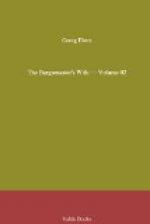When Wilhelm entered the street, it was only raining very slightly. The clouds were beginning to scatter, and from a patch of blue sky the sun was shining brightly down on Nobelstrasse. A rainbow shimmered in variegated hues above the roofs, but to-day the musician had no eyes for the beautiful spectacle. The bright light in the wet street did not charm him. The hot rays of the day-star were not lasting, for “they drew rain.” All that surrounded him seemed confused and restless. Beside a beautiful image which he treasured in the sanctuary of his memories, only allowing his mind to dwell upon it in his happiest hours, sought to intrude. His real diamond was in danger of being exchanged for a stone, whose value he did not know. With the old, pure harmony blended another similar one, but in a different key. How could he still think of Isabella, without remembering Henrica! At least he had not heard the young lady sing, so his recollection of Isabella’s songs remained unclouded. He blamed himself because, obeying an emotion of vanity, he had promised to send new songs to the proud young girl, the friend of Spain. He had treated Herr Matanesse Van Wibisma rudely on account of his opinions, but sought to approach her, who laughed at what he prized most highly, because she was a woman, and it was sweet to hear his work praised by beautiful lips. “Hercules throws the club aside and sits down at the distaff, when Omphale beckons, and the beautiful Esther and the daughter of Herodias—” murmured Wilhelm indignantly. He felt sorely troubled, and longed for his quiet attic chamber beside the dove-cote.
“Something unpleasant has happened to him in Delft,” thought his father.
“Why doesn’t he relish his fried flounders to-day?” asked his mother, when he had left them after dinner. Each felt that something oppressed the pride and favorite of the household, but did not attempt to discover the cause; they knew the moods to which he was sometimes subject for half a day.
After Wilhelm had fed his doves, he went to his room, where he paced restlessly to and fro. Then he seized his violin and wove all the melodies be had heard from Isabella’s lips into one. His music had rarely sounded so soft, and then so fierce and passionate, and his mother, who heard it in the kitchen, turned the twirling-stick faster and faster, then thrust it into the firmly-tied dough, and rubbing her hands on her apron, murmured:
“How it wails and exults! If it relieves his heart, in God’s name let him do it, but cat-gut is dear and it will cost at least two strings.”
Towards evening Wilhelm was obliged to go to the drill of the military corps to which he belonged. His company was ordered to mount guard at the Hoogewoort Gate. As he marched through Nobelstrasse with it, he heard the low, clear melody of a woman’s voice issuing from an open window of the Hoogstraten mansion. He listened, and noticing with a shudder how much Henrica’s voice—for the singer must be the young lady —resembled Isabella’s, ordered the drummer to beat the drum.




